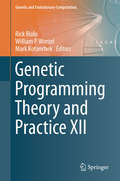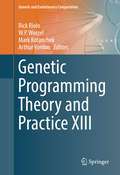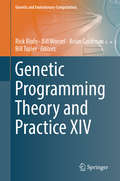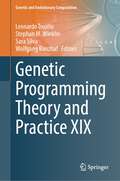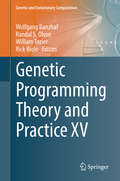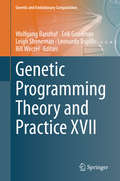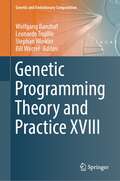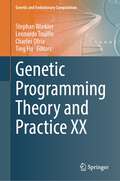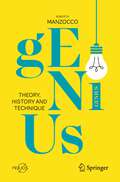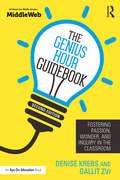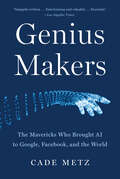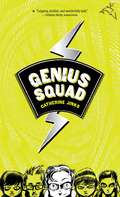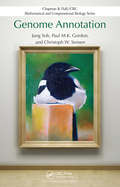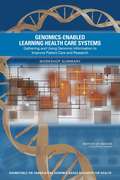- Table View
- List View
Genetic Programming Theory and Practice XII
by Rick Riolo William P. Worzel Mark KotanchekThese contributions, written by the foremost international researchers and practitioners of Genetic Programming (GP), explore the synergy between theoretical and empirical results on real-world problems, producing a comprehensive view of the state of the art in GP. Topics in this volume include: gene expression regulation, novel genetic models for glaucoma, inheritable epigenetics, combinators in genetic programming, sequential symbolic regression, system dynamics, sliding window symbolic regression, large feature problems, alignment in the error space, HUMIE winners, Boolean multiplexer function, and highly distributed genetic programming systems. Application areas include chemical process control, circuit design, financial data mining and bioinformatics. Readers will discover large-scale, real-world applications of GP to a variety of problem domains via in-depth presentations of the latest and most significant results.
Genetic Programming Theory and Practice XIII
by Rick Riolo W. P. Worzel Mark Kotanchek Arthur KordonThese contributions, written by the foremost international researchers and practitioners of Genetic Programming (GP), explore the synergy between theoretical and empirical results on real-world problems, producing a comprehensive view of the state of the art in GP. Topics in this volume include: multi-objective genetic programming, learning heuristics, Kaizen programming, Evolution of Everything (EvE), lexicase selection, behavioral program synthesis, symbolic regression with noisy training data, graph databases, and multidimensional clustering. It also covers several chapters on best practices and lesson learned from hands-on experience. Additional application areas include financial operations, genetic analysis, and predicting product choice. Readers will discover large-scale, real-world applications of GP to a variety of problem domains via in-depth presentations of the latest and most significant results.
Genetic Programming Theory and Practice XIV (Genetic and Evolutionary Computation)
by Rick Riolo Bill Worzel Brian Goldman Bill TozierThese contributions, written by the foremost international researchers and practitioners of Genetic Programming (GP), explore the synergy between theoretical and empirical results on real-world problems, producing a comprehensive view of the state of the art in GP. Chapters in this volume include: Similarity-based Analysis of Population Dynamics in GP Performing Symbolic RegressionHybrid Structural and Behavioral Diversity Methods in GPMulti-Population Competitive Coevolution for Anticipation of Tax EvasionEvolving Artificial General Intelligence for Video Game ControllersA Detailed Analysis of a PushGP RunLinear Genomes for Structured ProgramsNeutrality, Robustness, and Evolvability in GPLocal Search in GPPRETSL: Distributed Probabilistic Rule Evolution for Time-Series ClassificationRelational Structure in Program Synthesis Problems with Analogical ReasoningAn Evolutionary Algorithm for Big Data Multi-Class Classification ProblemsA Generic Framework for Building Dispersion Operators in the Semantic SpaceAssisting Asset Model Development with Evolutionary AugmentationBuilding Blocks of Machine Learning Pipelines for Initialization of a Data Science Automation Tool Readers will discover large-scale, real-world applications of GP to a variety of problem domains via in-depth presentations of the latest and most significant results.
Genetic Programming Theory and Practice XIX (Genetic and Evolutionary Computation)
by Leonardo Trujillo Stephan M. Winkler Sara Silva Wolfgang BanzhafThis book brings together some of the most impactful researchers in the field of Genetic Programming (GP), each one working on unique and interesting intersections of theoretical development and practical applications of this evolutionary-based machine learning paradigm. Topics of particular interest for this year´s book include powerful modeling techniques through GP-based symbolic regression, novel selection mechanisms that help guide the evolutionary process, modular approaches to GP, and applications in cybersecurity, biomedicine and program synthesis, as well as papers by practitioner of GP that focus on usability and real-world results. In summary, readers will get a glimpse of the current state of the art in GP research.
Genetic Programming Theory and Practice XV (Genetic and Evolutionary Computation)
by Wolfgang Banzhaf Randal S. Olson William Tozier Rick RioloThese contributions, written by the foremost international researchers and practitioners of Genetic Programming (GP), explore the synergy between theoretical and empirical results on real-world problems, producing a comprehensive view of the state of the art in GP. Topics in this volume include: exploiting subprograms in genetic programming, schema frequencies in GP, Accessible AI, GP for Big Data, lexicase selection, symbolic regression techniques, co-evolution of GP and LCS, and applying ecological principles to GP. It also covers several chapters on best practices and lessons learned from hands-on experience. Readers will discover large-scale, real-world applications of GP to a variety of problem domains via in-depth presentations of the latest and most significant results.
Genetic Programming Theory and Practice XVII (Genetic and Evolutionary Computation)
by Wolfgang Banzhaf Erik Goodman Leigh Sheneman Leonardo Trujillo Bill WorzelThese contributions, written by the foremost international researchers and practitioners of Genetic Programming (GP), explore the synergy between theoretical and empirical results on real-world problems, producing a comprehensive view of the state of the art in GP. In this year’s edition, the topics covered include many of the most important issues and research questions in the field, such as: opportune application domains for GP-based methods, game playing and co-evolutionary search, symbolic regression and efficient learning strategies, encodings and representations for GP, schema theorems, and new selection mechanisms.The volume includes several chapters on best practices and lessons learned from hands-on experience. Readers will discover large-scale, real-world applications of GP to a variety of problem domains via in-depth presentations of the latest and most significant results.
Genetic Programming Theory and Practice XVIII (Genetic and Evolutionary Computation)
by Leonardo Trujillo Wolfgang Banzhaf Bill Worzel Stephan WinklerThis book, written by the foremost international researchers and practitioners of genetic programming (GP), explores the synergy between theoretical and empirical results on real-world problems, producing a comprehensive view of the state of the art in GP. In this year’s edition, the topics covered include many of the most important issues and research questions in the field, such as opportune application domains for GP-based methods, game playing and co-evolutionary search, symbolic regression and efficient learning strategies, encodings and representations for GP, schema theorems, and new selection mechanisms. The book includes several chapters on best practices and lessons learned from hands-on experience. Readers will discover large-scale, real-world applications of GP to a variety of problem domains via in-depth presentations of the latest and most significant results.
Genetic Programming Theory and Practice XX (Genetic and Evolutionary Computation)
by Stephan Winkler Leonardo Trujillo Charles Ofria Ting HuGenetic Programming Theory and Practice brings together some of the most impactful researchers in the field of Genetic Programming (GP), each one working on unique and interesting intersections of theoretical development and practical applications of this evolutionary-based machine learning paradigm. Topics of particular interest for this year’s book include powerful modeling techniques through GP-based symbolic regression, novel selection mechanisms that help guide the evolutionary process, modular approaches to GP, and applications in cybersecurity, biomedicine, and program synthesis, as well as papers by practitioner of GP that focus on usability and real-world results. In summary, readers will get a glimpse of the current state of the- art in GP research.
The GENI Book
by Rick Mcgeer Mark Berman Chip Elliott Robert RicciThis book, edited by four of the leaders of the National Science Foundation's Global Environment and Network Innovations (GENI) project, gives the reader a tour of the history, architecture, future, and applications of GENI. Built over the past decade by hundreds of leading computer scientists and engineers, GENI is a nationwide network used daily by thousands of computer scientists to explore the next Cloud and Internet and the applications and services they enable, which will transform our communities and our lives. Since by design it runs on existing computing and networking equipment and over the standard commodity Internet, it is poised for explosive growth and transformational impact over the next five years. Over 70 of the builders of GENI have contributed to present its development, architecture, and implementation, both as a standalone US project and as a federated peer with similar projects worldwide, forming the core of a worldwide network. Applications and services enabled by GENI, from smarter cities to intensive collaboration to immersive education, are discussed. The book also explores the concepts and technologies that transform the Internet from a shared transport network to a collection of "slices" -- private, on-the-fly application-specific nationwide networks with guarantees of privacy and responsiveness. The reader will learn the motivation for building GENI and the experience of its precursor infrastructures, the architecture and implementation of the GENI infrastructure, its deployment across the United States and worldwide, the new network applications and services enabled by and running on the GENI infrastructure, and its international collaborations and extensions. This book is useful for academics in the networking and distributed systems areas, Chief Information Officers in the academic, private, and government sectors, and network and information architects.
Genius: Theory, History and Technique (Springer Praxis Books)
by Roberto ManzoccoGenius is a fascinating topic. Everyone has an opinion on it, but not a lot of clarity. Much has been written on the subject - biographies, autobiographies, technical books, popular science books, and practical manuals - but genius in all of its dimensions has yet to be addressed. This book seeks to remedy that. What follows is a work of significant breadth that hopes to facilitate a nuanced popular understanding of the definition of genius, examining all of the main theories and approaches regarding the nature and origin of brilliance, the cognitive path that geniuses follow, and the difference that exists between “geniuses” on one side and “normal people” on the other. Pragmatic indications surrounding this issue are also examined, regarding such questions as: is it possible to become a genius or is genius innate? If it is possible, what is the path – no doubt long and difficult – that one must take? Is there a method for becoming a genius that can be taught and learned? This book will appeal to anyone who has ever contemplated great ideas and works and wondered how they came into being.
The Genius Hour Guidebook: Fostering Passion, Wonder, and Inquiry in the Classroom
by Denise Krebs Gallit ZviPromote your students&’ creativity and get them excited about learning! In the second edition of this popular, practical book, authors Denise Krebs and Gallit Zvi show you how to implement Genius Hour, a time when students can develop their own inquiry-based projects around their passions and take ownership of their work. Brought to you by MiddleWeb and Routledge Eye On Education, the book takes you step-by-step through planning and teaching Genius Hour. You&’ll learn how to guide your students as they: ● inspire learning and brainstorm wonders; ● develop inquiry questions based on their interests; ● conduct research and experiments about their topic of choice; ● create presentations to teach their fellow students in creative ways; and ● present their finished product for a final assessment. This edition includes new chapters on managing your classroom projects and recommended books. Throughout the book you will find voices from the Genius Hour community sharing real life stories and inspiration. Appendices contain handy FAQs and ready-made lessons and resources. In addition, a companion website, www.geniushourguide.org, offers bonus materials and regular updates to support you as you implement Genius Hour in your own classroom.
Genius Makers: The Mavericks Who Brought AI to Google, Facebook, and the World
by Cade Metz<P><P>THE UNTOLD TECH STORY OF OUR TIME <P><P> What does it mean to be smart? To be human? What do we really want from life and the intelligence we have, or might create? With deep and exclusive reporting, across hundreds of interviews, New York Times Silicon Valley journalist Cade Metz brings you into the rooms where these questions are being answered. Where an extraordinarily powerful new artificial intelligence has been built into our biggest companies, our social discourse, and our daily lives, with few of us even noticing. Long dismissed as a technology of the distant future, artificial intelligence was a project consigned to the fringes of the scientific community. <P><P> Then two researchers changed everything. One was a sixty-four-year-old computer science professor who didn’t drive and didn’t fly because he could no longer sit down—but still made his way across North America for the moment that would define a new age of technology. The other was a thirty-six-year-old neuroscientist and chess prodigy who laid claim to being the greatest game player of all time before vowing to build a machine that could do anything the human brain could do. They took two very different paths to that lofty goal, and they disagreed on how quickly it would arrive. But both were soon drawn into the heart of the tech industry. Their ideas drove a new kind of arms race, spanning Google, Microsoft, Facebook, and OpenAI, a new lab founded by Silicon Valley kingpin Elon Musk. But some believed that China would beat them all to the finish line. <P><P> Genius Makers dramatically presents the fierce conflict between national interests, shareholder value, the pursuit of scientific knowledge, and the very human concerns about privacy, security, bias, and prejudice. Like a great Victorian novel, this world of eccentric, brilliant, often unimaginably yet suddenly wealthy characters draws you into the most profound moral questions we can ask. And like a great mystery, it presents the story and facts that lead to a core, vital question: How far will we let it go?
Genius Squad
by Catherine JinksNow that the Axis Institute for World Domination has been blown up; the founder, Dr. Phineas Darkkon, has died; and Prosper English (who enrolled Cadel in the first place) is in jail for myriad offenses, Cadel Piggott has round-the-clock surveillance so he'll be safe until he testifies against Prosper English. But nobody seems to want Cadel. Not Fiona, his social worker; not Saul Greeniaus, the detective assigned to protect him. When he is approached by the head of Genius Squad--a group formed to investigate GenoME, one of Darkkon's pet projects--Cadel is dubious Genius Squad can offer him a real home and all the technology his heart desires. But why can't he bring himself to tell Saul what the group is really up to? And how can Genius Squad protect Cadel once Prosper English breaks out of jail?
Genome Annotation (Chapman & Hall/CRC Computational Biology Series #46)
by Jung Soh Paul M.K. Gordon Christoph W. SensenThe success of individualized medicine, advanced crops, and new and sustainable energy sources requires thoroughly annotated genomic information and the integration of this information into a coherent model. A thorough overview of this field, Genome Annotation explores automated genome analysis and annotation from its origins to the challenges of next-generation sequencing data analysis.The book initially takes you through the last 16 years since the sequencing of the first complete microbial genome. It explains how current analysis strategies were developed, including sequencing strategies, statistical models, and early annotation systems. The authors then present visualization techniques for displaying integrated results as well as state-of-the-art annotation tools, including MAGPIE, Ensembl, Bluejay, and Galaxy. They also discuss the pipelines for the analysis and annotation of complex, next-generation DNA sequencing data. Each chapter includes references and pointers to relevant tools. As very few existing genome annotation pipelines are capable of dealing with the staggering amount of DNA sequence information, new strategies must be developed to accommodate the needs of today’s genome researchers. Covering this topic in detail, Genome Annotation provides you with the foundation and tools to tackle this challenging and evolving area. Suitable for both students new to the field and professionals who deal with genomic information in their work, the book offers two genome annotation systems on an accompanying downloadable resources.
Genomics and Bioinformatics
by Tore SamuelssonWith the arrival of genomics and genome sequencing projects, biology has been transformed into an incredibly data-rich science. The vast amount of information generated has made computational analysis critical and has increased demand for skilled bioinformaticians. Designed for biologists without previous programming experience, this textbook provides a hands-on introduction to Unix, Perl and other tools used in sequence bioinformatics. Relevant biological topics are used throughout the book and are combined with practical bioinformatics examples, leading students through the process from biological problem to computational solution. All of the Perl scripts, sequence and database files used in the book are available for download at the accompanying website, allowing the reader to easily follow each example using their own computer. Programming examples are kept at an introductory level, avoiding complex mathematics that students often find daunting. The book demonstrates that even simple programs can provide powerful solutions to many complex bioinformatics problems.
Genomics-Enabled Learning Health Care Systems: Workshop Summary
by Sarah H. BeachyThe inclusion of genomic data in a knowledge-generating health care system infrastructure is one promising way to harness the full potential of that information to provide better patient care. In such a system, clinical practice and research influence each other with the goal of improving the efficiency and effectiveness of disease prevention, diagnosis, and treatment. To examine pragmatic approaches to incorporating genomics in learning health care systems, the Institute of Medicine Roundtable on Translating Genomic-Based Research for Health hosted a workshop which convened a variety of stakeholder groups, including commercial developers, health information technology professionals, clinical providers, academic researchers, patient groups, and government and health system representatives, to present their perspectives and participate in discussions on maximizing the value that can be obtained from genomic information. The workshop examined how a variety of systems are capturing and making use of genomic data to generate knowledge for advancing health care in the 21st century. It also sought to evaluate the challenges, opportunities, and best practices for capturing or using genomic information in knowledge-generating health care systems. "Genomics-Enabled Learning Health Care Systems" summarizes the presentations and discussion of the workshop.
Genomics-Enabled Learning Health Care Systems: Workshop Summary
by Sarah H. BeachyThe inclusion of genomic data in a knowledge-generating health care system infrastructure is one promising way to harness the full potential of that information to provide better patient care. In such a system, clinical practice and research influence each other with the goal of improving the efficiency and effectiveness of disease prevention, diagnosis, and treatment. To examine pragmatic approaches to incorporating genomics in learning health care systems, the Institute of Medicine Roundtable on Translating Genomic-Based Research for Health hosted a workshop which convened a variety of stakeholder groups, including commercial developers, health information technology professionals, clinical providers, academic researchers, patient groups, and government and health system representatives, to present their perspectives and participate in discussions on maximizing the value that can be obtained from genomic information. The workshop examined how a variety of systems are capturing and making use of genomic data to generate knowledge for advancing health care in the 21st century. It also sought to evaluate the challenges, opportunities, and best practices for capturing or using genomic information in knowledge-generating health care systems. Genomics-Enabled Learning Health Care Systems summarizes the presentations and discussion of the workshop.
Genomics in the Azure Cloud
by Colby T. FordThis practical guide bridges the gap between general cloud computing architecture in Microsoft Azure and scientific computing for bioinformatics and genomics. You'll get a solid understanding of the architecture patterns and services that are offered in Azure and how they might be used in your bioinformatics practice. You'll get code examples that you can reuse for your specific needs. And you'll get plenty of concrete examples to illustrate how a given service is used in a bioinformatics context.You'll also get valuable advice on how to:Use enterprise platform services to easily scale your bioinformatics workloadsOrganize, query, and analyze genomic data at scaleBuild a genomics data lake and accompanying data warehouseUse Azure Machine Learning to scale your model training, track model performance, and deploy winning modelsOrchestrate and automate processing pipelines using Azure Data Factory and DatabricksCloudify your organization's existing bioinformatics pipelines by moving your workflows to Azure high-performance compute servicesAnd more
Genomics in the Cloud: Using Docker, GATK, and WDL in Terra
by Brian O'Connor Geraldine A. Van der AuweraData in the genomics field is booming. In just a few years, organizations such as the National Institutes of Health (NIH) will host 50+ petabytes—or over 50 million gigabytes—of genomic data, and they’re turning to cloud infrastructure to make that data available to the research community. How do you adapt analysis tools and protocols to access and analyze that volume of data in the cloud?With this practical book, researchers will learn how to work with genomics algorithms using open source tools including the Genome Analysis Toolkit (GATK), Docker, WDL, and Terra. Geraldine Van der Auwera, longtime custodian of the GATK user community, and Brian O’Connor of the UC Santa Cruz Genomics Institute, guide you through the process. You’ll learn by working with real data and genomics algorithms from the field. <p><p>This book covers: <li>Essential genomics and computing technology background <li>Basic cloud computing operations <li>Getting started with GATK, plus three major GATK Best Practices pipelines <li>Automating analysis with scripted workflows using WDL and Cromwell <li>Scaling up workflow execution in the cloud, including parallelization and cost optimization <li>Interactive analysis in the cloud using Jupyter notebooks <li>Secure collaboration and computational reproducibility using Terra
Genres on the Web
by Serge Sharoff Marina Santini Alexander MehlerThe volume "Genres on the Web" has been designed for a wide audience, from the expert to the novice. It is a required book for scholars, researchers and students who want to become acquainted with the latest theoretical, empirical and computational advances in the expanding field of web genre research. The study of web genre is an overarching and interdisciplinary novel area of research that spans from corpus linguistics, computational linguistics, NLP, and text-technology, to web mining, webometrics, social network analysis and information studies. This book gives readers a thorough grounding in the latest research on web genres and emerging document types. The book covers a wide range of web-genre focused subjects, such as: * The identification of the sources of web genres * Automatic web genre identification * The presentation of structure-oriented models * Empirical case studies One of the driving forces behind genre research is the idea of a genre-sensitive information system, which incorporates genre cues complementing the current keyword-based search and retrieval applications.
A Gentle Introduction to Optimization
by B. Guenin J. Könemann L. TunçelOptimization is an essential technique for solving problems in areas as diverse as accounting, computer science and engineering. Assuming only basic linear algebra and with a clear focus on the fundamental concepts, this textbook is the perfect starting point for first- and second-year undergraduate students from a wide range of backgrounds and with varying levels of ability. Modern, real-world examples motivate the theory throughout. The authors keep the text as concise and focused as possible, with more advanced material treated separately or in starred exercises. Chapters are self-contained so that instructors and students can adapt the material to suit their own needs and a wide selection of over 140 exercises gives readers the opportunity to try out the skills they gain in each section. Solutions are available for instructors. The book also provides suggestions for further reading to help students take the next step to more advanced material.
A Gentle Introduction to Scientific Computing (Chapman & Hall/CRC Numerical Analysis and Scientific Computing Series)
by Dan Stanescu Long LeeScientific Computation has established itself as a stand-alone area of knowledge in the border area between computer science and applied mathematics. Nonetheless, its interdisciplinary character cannot be denied: its methodologies are increasingly used in a wide variety of branches of science and engineering. A Gentle Introduction to Scientific Computing intends to serve a very broad audience of college students across a variety of disciplines. It aims to expose its readers to some of the basic tools and techniques used in computational science, with a view to helping them understand what happens ‘behind the scenes’ when simple tools such as solving equations, plotting and interpolation are used. To make the book as practical as possible, the authors explore their subject both from a theoretical, mathematical perspective and from an implementation-driven, programming perspective. Features Takes a middle ground approach between theoretical book and implementation Suitable reading for a broad range of students in STEM disciplines, and could be the primary text for a first course in scientific computing Introduces mathematics majors, without any prior computer science exposure, to numerical methods All mathematical knowledge needed beyond Calculus (and the more useful Calculus notation and concepts) is introduced in the text to make it self-contained.
The Gentrification of the Internet: How to Reclaim Our Digital Freedom
by Jessa LingelHow we lost control of the internet—and how to win it back. The internet has become a battleground. Although it was unlikely to live up to the hype and hopes of the 1990s, only the most skeptical cynics could have predicted the World Wide Web as we know it today: commercial, isolating, and full of, even fueled by, bias. This was not inevitable. The Gentrification of the Internet argues that much like our cities, the internet has become gentrified, dominated by the interests of business and capital rather than the interests of the people who use it. Jessa Lingel uses the politics and debates of gentrification to diagnose the massive, systemic problems blighting our contemporary internet: erosions of privacy and individual ownership, small businesses wiped out by wealthy corporations, the ubiquitous paywall. But there are still steps we can take to reclaim the heady possibilities of the early internet. Lingel outlines actions that internet activists and everyday users can take to defend and secure more protections for the individual and to carve out more spaces of freedom for the people—not businesses—online.
Gentzen Calculi for Modal Propositional Logic
by Francesca PoggiolesiThe book is about Gentzen calculi for (the main systems of) modal logic. It is divided into three parts. In the first part we introduce and discuss the main philosophical ideas related to proof theory, and we try to identify criteria for distinguishing good sequent calculi. In the second part we present the several attempts made from the 50's until today to provide modal logic with Gentzen calculi. In the third and and final part we analyse new calculi for modal logics, called tree-hypersequent calculi, which were recently introduced by the author. We show in a precise and clear way the main results that can be proved with and about them.
Geo-informatics in Sustainable Ecosystem and Society: 6th International Conference, GSES 2018, Handan, China, September 25–26, 2018, Revised Selected Papers (Communications in Computer and Information Science #980)
by Yichun Xie Anbing Zhang Haixin Liu Lili FengThis book constitutes the refereed proceedings of the 6th International Conference on Geo-informatics in Sustainable Ecosystem and Society, GSES 2018, held in Handan, China, in September 2018. The 46 papers presented in this volume were carefully reviewed and selected from 153 submissions and focus on spatial data acquisition, processing and management, modeling and analysis, and recent applications in the context of building healthier ecology and resource management using advanced remote sensing technology and spatial data modeling and analysis.
